Tasha Kheiriddin welcomes Andrea Mrozek of Cardus Family to look forward to what the new Census information means for Canada's future. According to the Census, more Canadians are living with grandparents, and more Canadian grandparents are raising grandchildren. Listen on AM640 in Toronto.
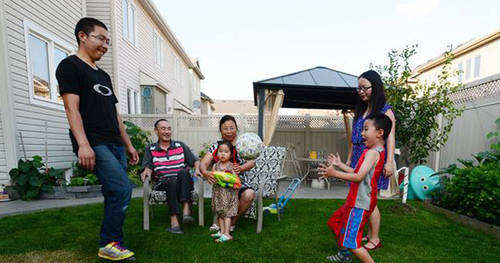
More Canadians living with Grandparents according to new Census
August 2, 2017
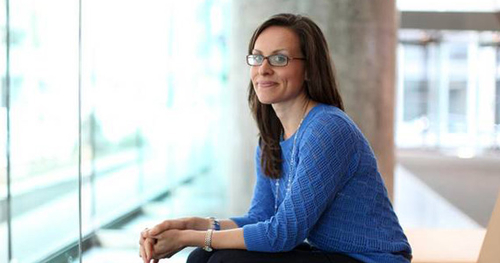
Canadian family stability
Andrea Mrozek discusses the new census information with Danielle Smith on AM770 radio in Calgary.
August 2, 2017
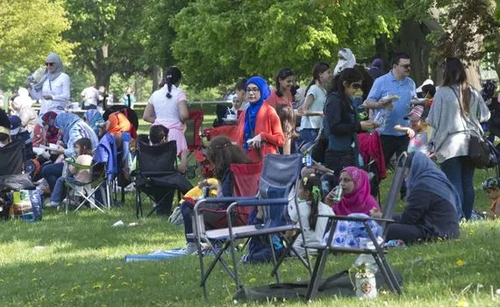
Cities cash in on halo effect
What is the value of a city’s faith-based congregations, in terms of their contributions to the common good? In London, it’s just over $811 million. That’s according to Cardus, an Ontario-based think tank that focuses on “North American social architecture.” And it’s hoping to refine those findings further in the months ahead. The organization estimates that “for every dollar in a religious congregation’s annual budget, a city gets an estimated $4.77 worth of common good services” — a “halo effect,” not unlike the multipliers often used by civic groups or municipalities to plug the spinoff economic benefits of sporting or cultural events and institutions. However, unlike the sometimes woolly estimates bandied about by event promoters or consultants, the halo multiplier is a fairly conservative tool based on real figures, drawn from Canada Revenue Agency data and vetted by McMaster University’s Public Economic Data Analysis Lab (PEDAL). The database builds on a project in Toronto and earlier work at the University of Pennsylvania. Take that London figure, for example. It’s derived from recent government figures that show 351 faith congregations in the city — a wide range including Christians, Muslims, Jews, Sikhs, etc. — with combined budgets of $170,027,809. The multiplier of 4.77, rooted in the earlier studies, brings the “halo benefit” to $811,032,649. That’s not insignificant in a city where the municipal budget itself is in the $1-billion range. Common-good services and assets, in the Cardus model, are captured in seven categories:Green space — lawns, gardens, garden plots, playgrounds, sports fields. Direct spending — operational and capital budgets, special projects and so on. Education — nursery schools, daycare and alternative schools. Magnet effects — conferences, weddings, funerals, religious festivals, money spent by visitors to the congregation and neighbourhood. Direct impact — services offered in areas such as suicide prevention, crime prevention, alcohol and substance abuse programs, marriage and relationship counselling, promotion of pro-social values and civic engagement among youth. Community development — job training, housing, lending services, small business and non-profit incubation. Social capital and care — volunteerism, meeting spaces, social programs such as food and clothing drives.The Cardus study makes clear that theirs is a work in progress; that it’s not so much interested in advocating for a point of view as it is in sharpening the tool’s accuracy and promoting dialogue along the way. What becomes equally clear is that, contrary to perceptions that faith congregations are insular, self-directed communities whose absence from city life would hardly be noticed, their contributions to Canadian life are significant and, perhaps, undervalued. They are good for the spirit — but they are also significant contributors to community building, engagement and a city’s bottom line. “The reality is if these congregations all disappeared, regardless of my individual beliefs are, or the next person’s, or my neighbour’s, all of us would see a decline in common good resources,” said Milton Friesen, a Cardus senior fellow and program director with its social cities projects. “What we’re saying is, if they disappear and you have to pick up that slack, that’s the size of the tab that’s coming your way. And the scale of that is quite significant.” Spiritual and faith communities have always been part of London, from the delicate creation-oriented traditions of our earliest Indigenous peoples, to the dominance of Christendom in the 19th and 20th centuries, to the solid-footed presence and integration of other faith traditions, such as Islam and Hinduism, today. Among Christian churches, a half dozen of them feature prominently in the city’s central core. Imagine downtown London without St. Peter’s basilica, Metropolitan and First St. Andrew’s churches, or St. Paul’s cathedral. Yet several of them have recently faced financial crises threatening their existence. For others, challenges still remain on the horizon. The “halo benefit” reminds us that the practical value of faith communities goes a fair distance beyond the benefits experienced by congregants themselves, regardless of their religious persuasion or geographic location within the city. And it’s a sobering reminder amid the slow decline of some of London’s important faith institutions. The “halo calculator” can be found at www.haloproject.ca. Larry Cornies is a London-based journalist. cornies@gmail.com — — — FAITH IN NUMBERSCity Religious OrganizationsHalo Benefit (in millions) Brantford 108 $105.8Cambridge 123 $187.2Chatham 67 $97.4Goderich 14 $17.1Hamilton 344 $866.4Ingersoll 13 $10.9Kitchener 232 $1,195.4Leamington 33 $44.4London 351 $811.0St. Thomas 16 $12.1Sarnia 77 $143.3Stratford 40 $56.5Waterloo 95 $305.2Windsor 211 $269.9Woodstock 56 $77.8
July 29, 2017
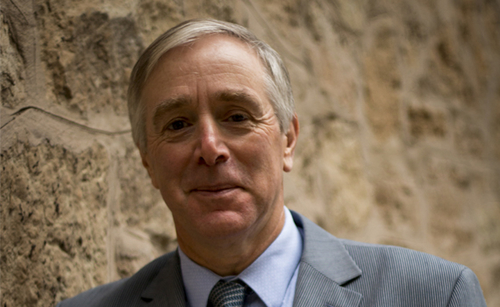
A ban on Muslim cemeteries is an attack on us all
Peter Stockland is senior writer at think-tank Cardus and publisher of Convivium.ca It would be easiest and most gratifying to call residents of Saint-Apollinaire, Que., nasty, anti-Islamic bigots for saying non to having a Muslim cemetery in town. It might, for a handful of the tiny fraction of villagers who voted in last Sunday's referendum on the matter, be true. But such name-calling and virtue signalling would not only miss the point, it would shamefully miss the opportunity to examine the deeper truths that this single-incident ugliness brings to the surface. Among the most crucial of those truths is one offered by a leader of the campaign to deny Muslims their own burial ground. Cemeteries, local resident Sunny Létourneau said as she went door-to-door collecting signatures to force the public vote, are a reflection of society as a whole. Ms. Létourneau insisted neither she nor others opposed to the new cemetery were motivated by anti-Muslim animus. They oppose separate Catholic cemeteries, too. They are against burial on the basis of any faith tradition, period. They want to stretch egalitarianism beyond the grave so that we are equally dead together. By extension, they deny the very existence of sacred earth. Whatever is hallowed by some must be hollowed of its particular holiness until it holds the same degree of emptiness for everyone. Alarming as such thinking might seem, Ms. Létourneau's explanation is more refreshingly candid than the freezer-burned disclaimer of Premier Philippe Couillard, who insisted it doesn't reflect Quebec society as a whole. True, the anti-cemetery bloc won by a minuscule three-vote margin. The "victory" was based on a ludicrously low 36 ballots being cast in a hamlet of 6,400 citizens. It is also true Quebec's political class, from local Mayor Bernard Ouellet to Mr. Couillard himself, was stung by the bumpkin embarrassment and have vowed to find a suitable workaround. But the view articulated by Ms. Létourneau is hardly confined to one bucolic 'burb on Quebec City's south shore. It is as much a fact of life in Montreal's dense urban borough of Outremont. Just as voters used democracy to disallow a Muslim cemetery in pastoral Saint-Apollinaire, so Outremont's urban trendies rallied to pass a zoning bylaw that outlawed building new places of worship; for example, synagogues and mosques. As Montreal-based writer Gideon Strauss wrote, those who carried the day in Outremont used the same tactics, to further the same argument, as their Saint-Apollinaire compatriots. They used the machinery of municipal government to overturn the essence of religious freedom, all while insisting that they had nothing against any specific religion. They just want to keep all society safely insulated from any form of religious faith. In that desire lies a crucial truth that affects all Canadians. It is the truth of our forgetting that religious freedom is about religion, yes, but it is first, last and always about freedom. As my colleague Andrew Bennett, Canada's first and last ambassador for religious freedom, puts it so eloquently: the freedoms of religion and conscience are and must be the first freedoms to which all others are bound. Why? Because if you are not free to believe, and that necessarily contains the freedom to share your personal and communal sense of the sacred in a respectful way, then you are not free at all. At best, you are licensed to act. You are granted permission to behave. You are allowed, whether by the state or by the limits at which your fellow citizens will inflict blunt-force democratic trauma, to be what others say you can be. You will be buried under the weight of Ms. Létourneau's ideal of cemetery egalitarianism. Name-calling in response to single incidents won't resolve that. Only digging deep into the truth underlying the ugliness will bring us face to face with what assaults on religious freedom mean for our whole society. Tiny Saint-Apollinaire has given us yet another opportunity to act. It would be a shame to miss it.
July 23, 2017
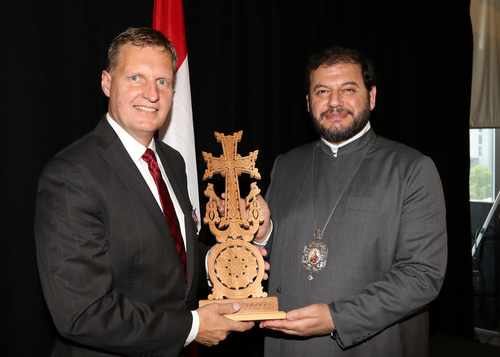
Sesquicentennial Gala in Ottawa
https://youtu.be/2NAwRxlwJMM On June 30, 2017, Cardus – the only Christian think-tank in Canada, within the framework of Faith in Canada 150 Project, organized the Gala Reception on the occasion of the 150th Anniversary of Canada, in the Governor General Ballroom at the Westin Ottawa. The Gala was co-sponsored by the Diocese. His Grace Bishop Abgar Hovakimyan, Primate, Rev. Archpriest Zareh Zargarian, Vicar, Parish Priest of Holy Trinity Armenian Church of Toronto, Rev. Fr. Komitas Mirzakhanyan, Parish Priest of Holy Cross Armenian Church of Laval, Mrs. Apet Alpay, Diocesan Council Chair, Mr. Jean-Philippe Tachdjian, Diocesan Council Member, Mr. Antranik Sirinyan, Chair of St. Gregory the Illuminator Armenian Cathedral of Montreal Parish Council, Mr. Hovsep Mardian, Diocesan Delegate, Mr. Levon Isakhanyan, Diocesan Chancellor, Dr. Levon Petrosyan, Deacon of St. Mesrob Armenian Church of Ottawa, attended the Gala. Bishop Hovakimyan was invited to bless the meal. Mrs. Isabel Bayrakdarian, renowned soprano, opened the Gala with the national anthem of Canada “O Canada”, and conducted three pieces, including the Pontifical Hymn “Amen Hayi srditz pkhadz”, and the Lord’s Prayer.
July 20, 2017
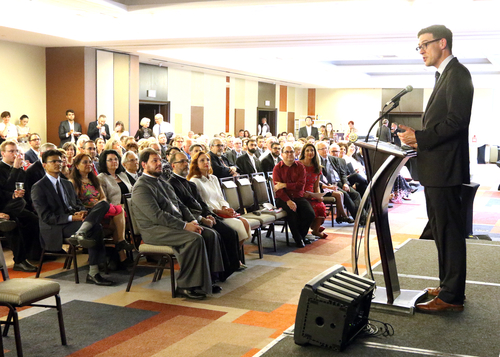
Malagash hall hosts annual general meeting
Last week I wrote about our trip to Ottawa and today want to tell you about a very special event we attended: The Sesquicentennial Gala, which was held on June 30 at the Westin Hotel, downtown Ottawa. It was sponsored by Cardus, a "think tank" group dedicated to the Renewal of Social Architecture – and was entitled Faith in Canada 150. Over 300 leaders of faith gathered in the spirit of friendship. What a fantastic evening! Best bib and tucker! We were the guests of our son-in-law Rev. Dr. Brent Stiller and our beautiful daughter, Karen, who is senior editor of Faith Today Magazine and has written and edited several books on faith. The evening was emceed by Farah Nasser, Global News anchor, and we were delighted to hear a wonderful soprano, Isabel Bayrakdarian, cantor Daniel Benlolo, Air Farce comedian Luba Goy, and Aboriginal leader Ray Aldred. Special guest speaker was the Dr. Angus Reid of the firm of Angus Reid Polls. How often we have heard his name attached to various polls at election time. It was exciting to be there and have such fun. I actually high-fived a fantastic guy who waxed eloquently on the beauty of Nova Scotia. Found out he had been a political appointment of the former PM Harper and it had a lot to do with faith in Canada. The AGM of the Malagash Community Hall was held on July 15 with very few people showing up for the meeting and free barbecue. Too bad really because the community hall is such an important part of any community and is available for suppers of various organizations, birthdays, weddings, funerals, anniversaries, meetings and the list goes on and on. I encourage everyone to support our community hall by joining for a small $5 fee. Feel free to contact me for any further information. Now maybe some of those not attending the meeting could be found at Jost Winery when the Rawlins Cross band was playing. From all reports this was a great afternoon of music with this Newfoundland-founded band. Well over 300 persons at this "ticket only" event. The winery was very busy with customers all through the day. What an asset this establishment is to our community! The next big event will be the Blueberry Festival on Saturday, Aug.19, with Signal Hill performing. This will be a ticket event, $15 through Eventbrite.ca. Planning on attending that one! Jig and Joker is still happening on Friday evenings at our local legion. The legion is open from 6 to 9 p.m. for fun and fellowship and hopefully a chance to "Jig for the Joker" and win some money. Some evenings there is special food and that is always a hit. Plans are being made for the annual Three Harbours Camp to be held at St. John's in Wallace on Aug. 4 at 2:30 and it will run until after worship at 10 a.m. at the church. All youth are invited to join the leaders for Inter-Faith Investigation. They will become private investigators working to solve the mystery of who worships who, and how and why? The program includes many activities, a movie, sleeping over on air mattresses in the basement, and listening and learning in faith. Our first beach ministry was held on July 9 at McNeill's Beach on the South Shore Road and next one will be on Aug. 13. It starts at 5:30 p.m. and all you have to bring is your chair, and bathing suit if you want to take a dip, and some hotdogs to grill. Lots of fun! Have a wonderful week everyone and stay safe. Marian Durling is the Malagash and area columnist for the Citizen-Record.
July 19, 2017
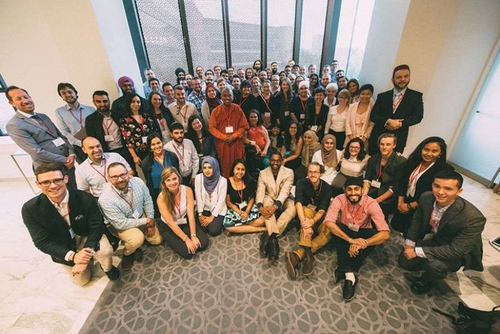
Faithful Millennials? We do Exist and We are the Future!
I had the great pleasure of participating in the Faith in Canada 150 Millennial Summit recently in Ottawa. This Summit brought together young Canadians from many different faith backgrounds to discuss how faith has shaped the history of Canada and the role faith will play in its future. More than that, the Summit was pluralism in action. The Pluralism Project at Harvard University defines pluralism as “not just tolerance, but the active seeking of understanding across lines of difference,” through dialogue,[1] and this is exactly what I experienced. This Summit was about coming together from our different backgrounds, discussing the differences and similarities, and applying our experiences to the shared challenges of being people of faith in our secular society. Although we did discuss our different faith traditions, it wasn’t only about our differences – it was about building relationships. It was about getting young adults of faith together in a room with trust, safety, and mutual respect, and seeing what happened. And what happened was amazing! We connected, shared, and were vulnerable about the difficulties we face. We were challenged by the older faith voices in the room to live our faith out loud. We explored what true pluralism is in a secular society where tolerance reigns supreme. But most importantly, true and lasting friendships were formed. By the end of the three days, no one wanted to leave! I am pleased to say that this Summit was not the end, but only a beginning. We created a network and are planning future events in our own cities. https://youtu.be/nfY49-Oo8XI It is difficult to sum up this experience in only a few hundred words, so I am going to add some key points of wisdom that I gleaned throughout this experience:There is a grace in being able to have uncomfortable conversations. Dialogue is the key to opening understanding. There is a need to surround ourselves with those who think differently from us. The echo chamber does not challenge you or allow you to grow. Tolerance and pluralism are not the same thing. Most of us felt that older generations tolerated people of other faiths, but did not embrace pluralism. We are committed to exploring what true pluralism and inter-faith dialogue is in Canada. Fighting for another’s rights is a fundamental part of being Canadian. When we fight for another’s rights, we fight for our own rights. Fighting for and protecting freedom of religion for all groups in Canada is key to increasing pluralism. Faith and science are not incompatible. Many people of faith believe in science, but are not defined by it and do not place their complete trust in its findings. Living in harmony with each other and the land is key to our future. We need to adopt the First People’s attitude of looking 7 generations ahead when making decisions. Faith has always been important to the people of Canada, from the indigenous groups, to the newcomers, people of faith have helped build this country. We need to protect the rights of people of faith for 7 generations and beyond.One sentiment that has stuck with me was when Rabbi Daniel Friedman stated that, on the verge of Canada’s 150th anniversary, it was young adults of faith who were meeting to discuss the future of our nation. There was no similar meeting of young atheists. So, while Canada may tout its secularism and push for a completely private faith, it is the people of faith who are actively looking to the future and seeking a way for us to live together in peace and freedom for all.https://youtu.be/20O0sMzgJUY
July 18, 2017
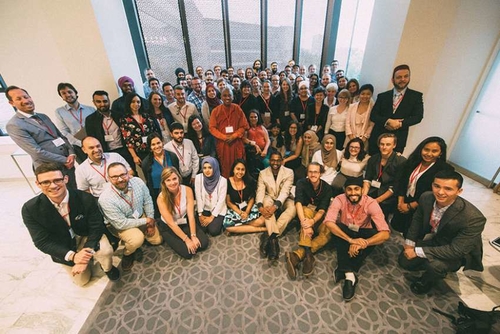
Make Us As Waves of the Sea: Reflecting on the Faith in Canada 150 Millennial Summit
To read the full article, click here .
July 16, 2017
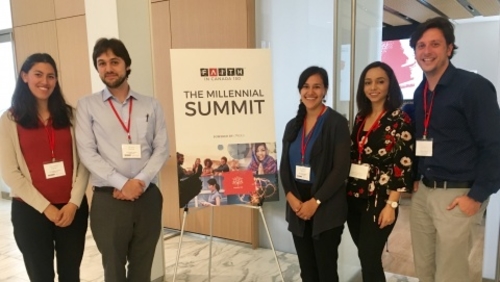
Young people gather to reflect on the role of religion in Canadian society
From June 28-30, five Baha’is joined a group of 75 young people in Ottawa to participate in a conversation about the role of religion in Canadian common life, the importance of religious freedom, and the true nature of pluralism. Participants in the gathering came from across the country and from diverse religious backgrounds. On the eve of Canada’s sesquicentennial celebrations, the Faith in Canada 150 Millennial Summit sought to stimulate reflection among young people of faith on the significant role religion has played in shaping Canadian society, the role it continues to play in the lives of the titular generation, and the potential it has for making a powerful and unique contribution to the common good in future years. The delegates from the Baha’i community were selected from among many young people who applied to participate in the Millennial Summit. They contributed in a variety of ways to the gathering, including one who served on the organizing committee. The Summit, as well as the Faith in Canada 150 project as a whole, was organized and hosted by Cardus, a Canadian think tank, in collaboration with a variety of other organizations and individuals, including the Baha’i Community of Canada. One of the overriding themes of the gathering was the value of questions in bringing the role of faith out from the confines of individual private life into public consciousness through open dialogue. Throughout the program, small groups engaged in lively discussion framed by questions like “What does it mean to be a millennial who is faithful?” “Do millennials have a different understanding of private and public faith?” “How do we address faith on the fringes, such as extremism and how it enters the public space?” “How do we confront secularism and relativism and the drive to absolute autonomy in our society?” “The emphasis on dialogue at the gathering helped to avoid the pitfalls of focusing on differences between participants, and helped to focus on issues of broader common concern,” said Eric Farr, one of the participants from the Baha’i community. “People were thinking deeply about important questions related to what we can all contribute to the public square.” Many delegates commented on the Summit’s warm environment, the high quality of conversation, and the genuine friendships that were formed. Laura Friedmann, one of the participants who served on the organizing team, said, “This summit stands out to me as one full of authentic conversations where participants were genuinely interested in sharing their deep thoughts and concerns and creating lasting friendships.” Another significant theme that was explored both in discussion, and reflected throughout the conference, was the nature and content of one’s participation in public discourse. In a contemporary public sphere, people of different faiths can make distinctive contributions by bringing religion’s moral and spiritual insights to bear on issues of public concern through the rich and compelling language of their traditions. “These contributions can assume greater relevance and distinctiveness when they avoid associating with narrow categories of “progressive” and “conservative” that so often frame public discourse today,” commented Farr. Instead, he reflected, they should endeavour to embody a spirit of humility and hope in the possibility of meaningful social change that is an enduring characteristic of religion. The summit concluded with encouraging remarks from several members of Cardus’ staff and leadership, including Hannah Marazzi, the key project lead on the Millennial Summit, and Dr. Andrew Bennett, a senior research fellow at Cardus and Canada’s former Ambassador of Religious Freedom. Ujarak Apadoo, a Baha’i youth from Montreal, was able to leave the summit with inspiring words from the Writings of ‘Abdu’l-Baha, leading the delegates in singing a few verses that, in many ways, embodied the collective spirit and aspirations of the summit: “O Lord God! Make us as waves of the sea, as flowers of the garden, united, agreed through the bounties of Thy love.” UPDATE: an e-book developed by Faith in Canada 150, which summarizes statements from the summit can be found here: Millenial Summit Legacy Book
July 15, 2017
